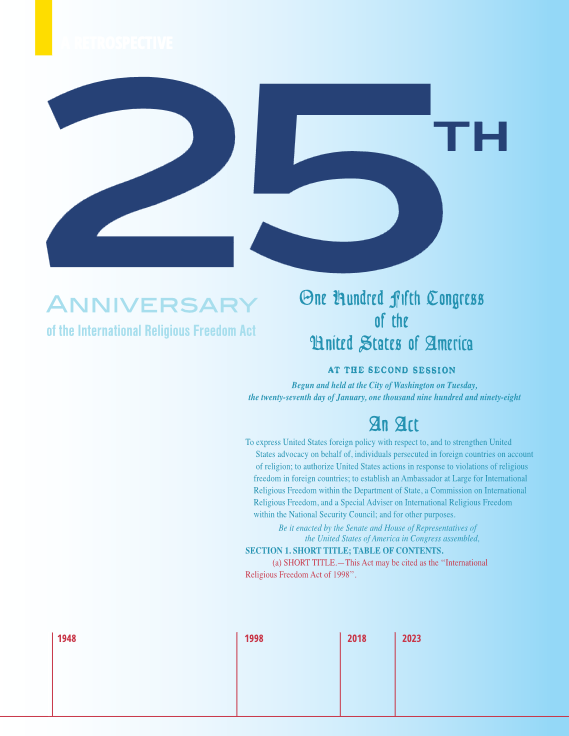The U.S. Commission on International Religious Freedom (USCIRF) recently released: “A Retrospective: 25th Anniversary of the International Religious Freedom Act.” Commemorating last fall’s 25th anniversary of the 1998 International Religious Freedom Act (IRFA), this report gathers insights from numerous experts and practitioners as they reflect on efforts to integrate international religious freedom with U.S. foreign policy. Among them were RFI President Emeritus Tom Farr, Middle East Director Jeremy Barker, and North America Director Nathaniel Hurd.
Turning first to early implementation of IRFA, the report states, “Thomas F. Farr, who would become the first-ever Director of the Office on International Religious Freedom, described the foreign policy establishment at the time [of IRFA’s passage] as having a reticence ‘about addressing the religious factors in other cultures and indeed in seeing culture as an expression of religion at all.'” The report continues, “Our ‘enemy’ at Foggy Bottom…was not so much hostility to our mission as indifference to, or confusion about, the policy value of religious freedom,” quoting from Farr’s 2008 book, World of Faith and Freedom.
The report’s focus later turns to the “unique challenges and concerns” of the present moment and international religious freedom policy and practice moving forward.
A key IRFA challenge is a lack of U.S. enforcement action against egregious religious freedom violators (Countries of Particular Concern). Nathaniel Hurd is quoted saying, “The Executive Branch is addicted to waiving sanctions against Countries of Particular Concern.” “It will be impossible to definitively judge IRFA’s effectiveness until presidents act against CPCs as Congress intended,” Hurd added.
The report also highlights RFI’s Jeremy Barker for his remarks on the “humanitarian and development” aspects of international religious freedom policy and practice. According to Barker, “There is a big movement within broader humanitarian and development spaces towards the localization of assistance.” He continues, “Many of the most effective organizations working in communities around the world are faith-based at some level because most of the places around the world are faith-based and have a huge percentage of people who identify with a religious community. If you want to invest in local support structures, look at who’s already there and work with them.”
The report also quoted Barker from a 2021 congressional testimony where he said, “Religious freedom matters deeply because it is connected to the human dignity of every person.” This is a critical first principle at the core of religious freedom — i.e., human beings are innately religious, and if they are not free to live according to religious truth, they cannot live a fully human life.
Read the full USCIRF report: “A Retrospective: 25th Anniversary of the International Religious Freedom Act.”
THE RFI BLOG

Is Egypt’s Government Trying To Take Over Christianity’s Most Important Monastery?

Does Southeast Asia Lead the World in Human Flourishing?

RFI Leads Training Session on Religious Freedom Law and Policy for U.S. Army War College

Oral Argument in Charter School Case Highlights Unconstitutional Motives Behind OK Attorney General’s Establishment Clause Claim

Largest Longitudinal Study of Human Flourishing Ever Shows Religion’s Importance
CORNERSTONE FORUM

Reaffirming Religious Freedom: Bridging U.S. Advocacy and Iraq’s Constitutional Framework

Political Polarization, Same-Sex Marriage and Religious Liberty

Bridging the Gap Between International Efforts and Local Realities: Advancing Religious Freedom in the MENA Region

Challenges to Religious Freedom in Iraq and the Critical Need for Action


